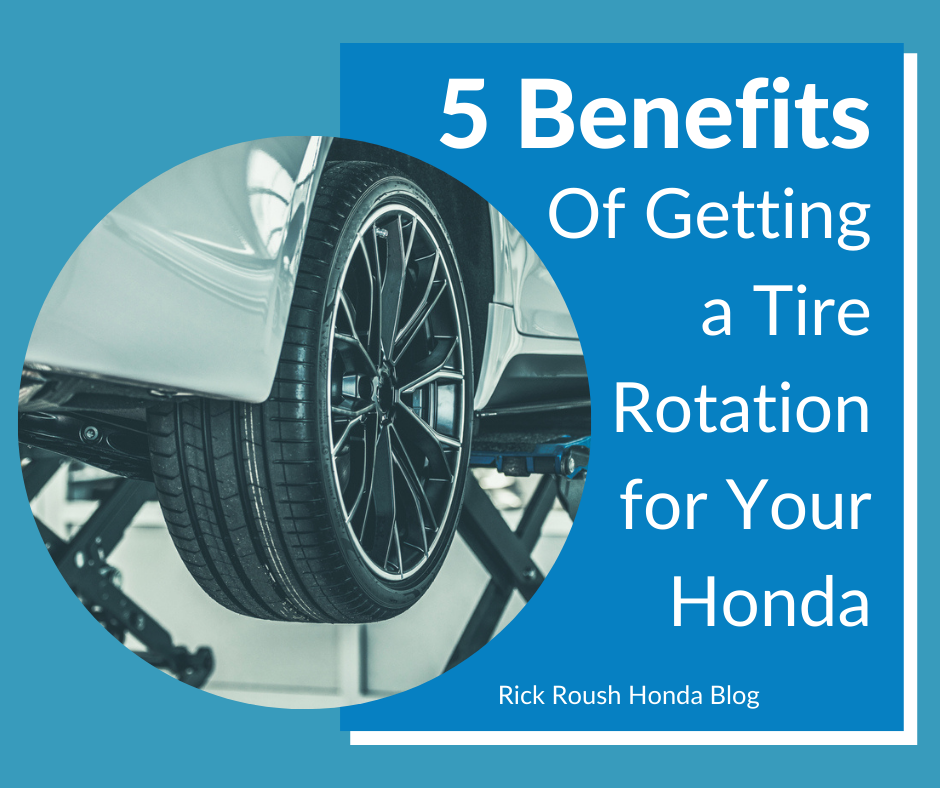Tire rotation is essential for maintaining your vehicle. It helps ensure even tire wear.
But what are the benefits? Regular tire rotation extends the life of your tires. It helps improve your car’s performance and safety. By rotating your tires, you can prevent uneven wear. This means better handling and traction on the road.
Plus, it can save you money in the long run by reducing the need for frequent tire replacements. Properly rotated tires also contribute to better fuel efficiency. Overall, understanding the benefits of tire rotation can help you maintain your vehicle more effectively and keep you safe on the road. Let’s dive deeper into why tire rotation is so important for every car owner.

Credit: www.rickroushhonda.com
Importance Of Tire Rotation
Maintaining your vehicle’s tires extends their lifespan and ensures a smoother ride. Tire rotation is a key part of tire maintenance. It prevents uneven wear and promotes safety. Let’s dive into why tire rotation is important.
What Is Tire Rotation?
Tire rotation involves changing the position of each tire on your vehicle. This process ensures even wear on all tires. Front tires often wear out faster due to steering and braking. By rotating tires, you balance out this wear. This helps prolong the life of your tires.
How Often To Rotate Tires
Rotate your tires every 5,000 to 7,500 miles. Check your vehicle’s manual for specific recommendations. Regular rotation keeps your tires in good condition. It also helps maintain proper traction and handling. Regular rotation can save you money in the long run.
Extending Tire Life
Regular tire rotation is essential for maintaining your vehicle. It helps extend the life of your tires. By moving tires to different positions on the vehicle, each tire gets even wear. This simple practice can save you money and improve safety.
Even Tire Wear
One of the main benefits of tire rotation is even tire wear. Tires wear differently depending on their position. Front tires often wear out faster than rear tires. This is due to steering and engine weight.
By rotating your tires, you balance out this wear. This means each tire will last longer. Consider rotating your tires every 5,000 to 8,000 miles. This can make a significant difference.
Preventing Tire Damage
Rotating your tires can also help prevent tire damage. Uneven wear can lead to weak spots. These weak spots can cause flats or blowouts. Regular rotation ensures all tires share the load equally.
It also allows you to inspect your tires regularly. This helps you spot and fix problems early. Keeping your tires in good condition is crucial for safety.
Overall, tire rotation is a small task with big benefits. It keeps your tires in better shape for longer. It helps you avoid costly repairs and replacements. And it keeps you safer on the road.
Saving Money With Tire Rotation
Tire rotation is a smart way to save money. It involves moving the tires from one position to another. Regular tire rotation can help your tires last longer. It can also improve your car’s performance.
Reducing Replacement Costs
Tire rotation helps reduce wear and tear. This means your tires will last longer. You will not need to buy new tires as often. This can save you a lot of money over time.
When tires wear evenly, they perform better. They provide better traction and handling. This can make your driving experience safer and more enjoyable.
Improving Fuel Efficiency
Uneven tire wear can affect your car’s fuel efficiency. Tires that are not rotated regularly can cause your car to use more fuel. This is because the engine has to work harder to move the car.
Rotating your tires helps them wear evenly. This can improve your car’s fuel efficiency. You will spend less money on gas. This is another way tire rotation can help you save money.

Credit: gmspecialist.com
Improving Vehicle Performance
Regular tire rotation is essential for improving vehicle performance. This practice ensures that all tires wear evenly, enhancing overall driving experience. Let’s dive into some key benefits of tire rotation.
Enhanced Traction
Rotating your tires helps in maintaining even tread wear. This is vital for maintaining good traction. With even wear, your tires grip the road better. This is especially important in wet or icy conditions.
Better traction means your vehicle handles better in adverse weather. It also helps in reducing the risk of hydroplaning. This ensures that you have more control over your vehicle at all times.
Better Handling
Even tire wear results in better handling. Your vehicle responds more predictably to steering inputs. This makes for a smoother and safer driving experience.
Uneven tire wear can cause your car to pull to one side. This affects the handling and makes your drive less enjoyable. Regular tire rotation ensures that your vehicle remains stable and easy to control.
Safety Benefits
Tire rotation offers several safety benefits for your vehicle. By rotating tires regularly, you ensure even wear and tear. This practice enhances your vehicle’s performance and safety on the road.
Reduced Blowout Risk
One significant benefit of tire rotation is the reduced blowout risk. Tires wear out at different rates. Front tires often wear faster due to steering and braking. By rotating your tires, you distribute wear evenly. This minimizes the chance of a blowout.
Blowouts can be dangerous. They can lead to accidents or loss of control. Regular tire rotation helps prevent this risk. Keep your tires in good condition for a safer driving experience.
Improved Braking
Another safety benefit of tire rotation is improved braking. Evenly worn tires provide better traction. This results in shorter braking distances. In emergencies, every inch counts. Good tire condition can make a big difference.
Uneven tire wear affects your vehicle’s braking ability. It can cause the car to pull to one side. This is dangerous, especially in wet or icy conditions. Regular tire rotation ensures all tires perform equally. You get better control and safer stops.
Consider tire rotation as a part of your regular vehicle maintenance. It’s a simple step with significant safety benefits.

Credit: www.facebook.com
Diy Vs Professional Rotation
DIY vs Professional Rotation is a critical decision for many car owners. Both methods have their pros and cons. DIY tire rotation can save you money. Professional services may offer expertise and advanced tools. Understanding the differences helps you decide the best option for you.
Tools And Equipment Needed
To rotate tires yourself, you need some basic tools. These include a car jack, jack stands, and a lug wrench. A torque wrench ensures the lug nuts are tightened correctly. You might also need wheel chocks to prevent the car from moving.
Professional mechanics have access to advanced tools. They use hydraulic lifts, which make the process faster. They also have impact wrenches for quick removal and tightening of lug nuts. Their tools are often more precise and reliable.
When To Seek Professional Help
Sometimes, it’s best to seek professional help. If you lack the right tools, a mechanic can save you time and hassle. They can also spot other issues during the tire rotation. This can include uneven tire wear or suspension problems.
If you are unsure about the process, professionals can ensure it’s done correctly. They also have the knowledge to handle unique car models. This is important for all-wheel-drive or four-wheel-drive vehicles, which require specific rotation patterns.
In some cases, rotating tires yourself can void the warranty. Always check your vehicle’s warranty and guidelines. If in doubt, professional services might be the safer option.
Signs Your Tires Need Rotation
Tire rotation is essential for maintaining your vehicle’s performance and safety. Knowing the signs your tires need rotation can help you avoid potential problems. Below are some key indicators that it might be time to rotate your tires.
Uneven Tread Wear
One of the most common signs is uneven tread wear. Check your tires regularly. If you notice that one tire is wearing out faster than the others, it’s time for a rotation.
Uneven wear can occur for several reasons, including improper alignment or driving habits. Rotating your tires helps distribute the wear more evenly, extending their lifespan.
Vehicle Vibration
Another clear sign is vehicle vibration. If your car vibrates while driving, especially at higher speeds, it could be due to tire imbalance. Rotating your tires can help reduce this vibration.
Vibration not only makes your ride uncomfortable but can also affect other components of your vehicle. Regular tire rotation ensures a smoother and safer driving experience.
Tips For Effective Tire Rotation
Rotating your tires helps them wear evenly. This improves handling and extends tire life. Following some tips ensures you get the most from your tire rotation. Let’s dive into these tips.
Following Manufacturer Guidelines
Check your car’s manual for tire rotation guidelines. Different cars need different rotation patterns. Front-wheel drive, rear-wheel drive, and all-wheel drive vehicles each have their own needs. Follow these recommendations closely. This keeps your car performing its best.
Tracking Rotation Schedule
Keep a record of your tire rotations. Note the date and mileage each time. Regular rotation is key. Aim to rotate every 5,000 to 8,000 miles. This prevents uneven wear. It also helps spot potential issues early. Use a logbook or app to track this. Staying organized makes a big difference.
Frequently Asked Questions
What Is Tire Rotation?
Tire rotation is moving tires to different positions on the car.
Why Is Tire Rotation Important?
It helps tires wear evenly. This makes them last longer.
How Often Should I Rotate My Tires?
Usually, every 6,000 to 8,000 miles. Check your car’s manual.
Does Tire Rotation Improve Safety?
Yes, it ensures better traction and handling on the road.
Can Tire Rotation Save Money?
Yes, it extends tire life. This reduces the need for replacements.
Conclusion
Regular tire rotation keeps your vehicle running smoothly. It extends tire life. Plus, it ensures even tire wear. This practice can save money on replacements. Improved traction and handling enhance safety. Simple maintenance like this prevents bigger issues. So, don’t skip tire rotation.
Your car and wallet will thank you. Regular rotations are key to a smooth ride. Enjoy safer travels with well-maintained tires.

















